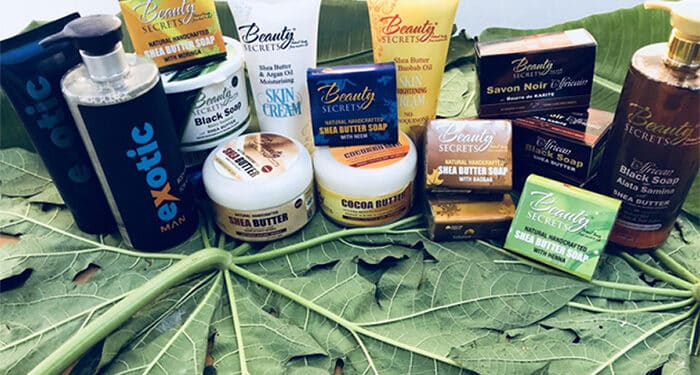Solution Oasis, a Ghanaian manufacturing business founded by Francesca Opoku, first started selling cosmetics products under its Beauty Secrets brand in 2008. The company processes ingredients such as shea butter, cocoa butter, natural oils and herbs into soap, lotions and shower gel. Jeanette Clark speaks to Opoku about her vision for an export-oriented brand, finding customers and the opportunity she sees under the African Continental Free Trade Area.
While Francesca Opoku was completing her degree at the University of Ghana Business School, she dreamt of opening her own beauty products store. After graduation, she landed a corporate job but it soon became evident that working for someone else did not match her temperament or aspirations. She revived her initial entrepreneurial dreams and started doing market research.
Opoku was accustomed to using cocoa butter as a beauty product but wanted to create her own instead of using another brand. So, 15 years ago, she began with 100 jars of cocoa butter moisturiser made in her dining room.
Setting up for export, from day one
“As with every start-up, there was a lot of uncertainty,” she says of those early days. “I was afraid I had not done enough research or had the right resources. I had to feel my way through those initial years.”
Opoku continuously worked on her business plan and adapted her product formulas, recruited the right team and refined her marketing strategy.
She wanted to position her products for export. For example, she paid specific attention to the packaging, including both English and French, and started the export certification process as soon as possible.
When she added shea butter products to Beauty Secret’s inventory, she joined the Global Shea Alliance to expand her network and gain exposure at international conferences. “This is where I received my first proper export order, about two years into production, from one of those conferences,” says Opoku. “We were selling locally. A few customers would buy stock and take it over the border, but we had no official export customers until then.”
Face-to-face marketing
Personal contact with potential customers helped secure an export deal. Opoku believes this approach also helped to grow Solution Oasis’ domestic market. Having a presence at bazaars, fairs and trade shows – where face-to-face contact and interaction with customers take place – contributed to steady and organic growth for her company. It increased awareness and built market demand to the point where customers would add the product to their trolley when they saw it on the shelves.
Over time, Beauty Secrets has made its way into large supermarket chains such as Shoprite and Palace. It is also stocked in pharmacies and smaller shops and has a kiosk in the duty-free section of Accra’s international airport.
The company also ramped up its online presence during and after the Covid-19 pandemic.
Product diversification
The company has three brands: Beauty Secrets, Exotic Men and Kipenzi. The latter is a luxury brand that Opoku is still in the process of launching.
When she made her first batch of cocoa butter moisturisers in 2008, Opoku was convinced they would be a hit. While it did well, it was not the company’s best-seller. “The shea body butter was far more popular and when we introduced the black soap, it outstripped sales of all the other products.” Black soap is a traditional, natural soap with no caustic soda, made in West Africa. It usually contains ash, which gives it its dark colour. Beauty Secret uses coconut and palm kernel oil with shea butter and cocoa pod ash.
“We make it the traditional way and add essential oils such as eucalyptus with other ingredients like honey and lemongrass,” says Opoku.
Production and sourcing
The company employs 20 people in its factory, where only around 20% of the processes are mechanised. “We use a melting machine and a few imported finishing machines for the packaging, but the rest is still very manual, from the soap production to the moulding,” says Opoku.
Many of the first steps for production already happen at the source. Solution Oasis partners with over 200 women farming co-operatives across the country from whom it procures the necessary ingredients. These women collect, knead and mill shea nuts or start the oil extraction process.
The factory can make about 2,000 bars of soap daily or 300kg of lotion per batch. “We wait until we have enough demand for a specific product and then produce,” explains Opoku.
Follow the trends
Solution Oasis invites feedback from customers, adapting its product offering to what is in demand. The company has, for example, been made aware of a growing interest in hair care products and will consider developing a range when the time is right.
However, the current trend-driving strategy is the global move towards organic and natural products. What Opolu finds even more exciting is an emerging preference from consumers on the continent for African-origin products. “We sell authentic products using recipes that have been around for generations.”
Opoku is adamant: even though she already has a growing customer base in Asia and the US, the next 10 years will be all about Africa. “Strategies change. With the African Continental Free Trade Area in play, the plan for the next decade is to become a well-known and go-to African brand on the African continent.”
To achieve this goal, Opoku has identified “hotspots” for expansion: Nigeria in West Africa, Kenya in East Africa and South Africa in the south.
“I am not really aiming for North Africa. That market has not yet acquired the taste for authentic African products, which my growth plan requires. As much as I continue to serve my customers in the US and Asia, the focus will be closer to home.” She reveals she is researching product and company registration in some of these hotspots.
“I would like to build a market first, pushing volumes from Ghana, before investing in production in those markets. It just makes more sense,” she adds.
Source: howwemadeitinafrica.com


